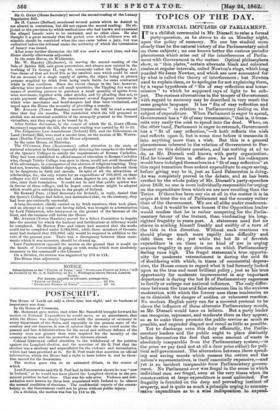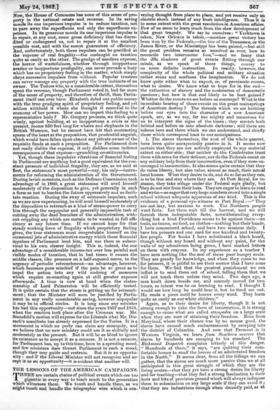TOPICS OF THE DAY.
THE FINANCIAL IMPULSES OF PARLIAMENT.
IT is a childish ceremonial in Mr. Disraeli to raise a formal party-question, as he strove to do on Monday night, upon the policy of economy. No one has studied more closely than he the natural history of the Parliamentary mind on these subjects ; no one knows better the curious periodic phenomena which arise out of the interferences of Parlia- ment with Government in the matter. Optical philosophers show, in " thin plates," certain alternate black and coloured circles at regular intervals, called Newton's rings, which long puzzled Sir Isaac Newton, and which are now accounted for by what is called the theory of interferences ; but Newton used to explain them, or to apologize for not explaining them, by a vague hypothesis of "fits of easy reflection and trans.- mission" to which he supposed rays of light to be sub- ject. The curious alternations in the temper of Government with regard to economy may be described in very much the same graphic language. It has "fits of easy reflection and transmission" in relation to Parliamentary feeling on the subject of expenditure. When Parliament is eager to spend,. Government has a "fit of easy transmission," that is, it trans- mits very easily the wish to spend into the deed. When, on the other hand, Parliament is eager to retrench, Government has a "fit of easy refiection,"—it both reflects the wish and reflects upon it, but is some time before it transmits it into anything more than a wish. But this is a general phenomenon inherent in the relation of Government to Par- liament on this delicate question, and has nothing at all to do, as Mr. Disraeli well knows, with party organization... Had he himself been in office now, he and his colleagues would have indulged themselves in a "fit of easy reflection." at this rapid transition from ardent expenditure to eager saving, before giving way to it, just as Lord Palmerston is doing.. As was completely proved in the debate, and as has been verified by the whole policy of Mr. Disraeli's party-speeches since 1859, no one is more individually responsible for urging on the expenditure from which we are now recoiling than the Tories. If there has been any sin at all in the matter it is in origin at least the sin of Parliament and the country rather than of the Government. We are all alike under condemna- tion. And it would be more honest if the Opposition leader would confess that he is rather competing for the Parlia- mentary favour of the instant, than vindicating his long- sighted frugality in years past. A. statesman need feel no shame in availing himself frankly and swiftly of a turn or the tide in this direction. Without such reactions we should plunge much more rapidly into difficulty and debt than we do ; yet while the hot fit of feverish expenditure is on there is no kind of use in urging anxious frugality in any direction on which Parliamentary feeling runs high. The frugal statesman's true opportu- nity for moderate retrenchment is during the cold fit of shuddering with which, in times of commercial depres- sion, the House comes to regard what it had formerly looketi upon as the true and most brilliant policy ; just as his true opportunity for moderate improvement in any important department is during the hot tit of Parliamentary eagerness. to fortify or enlarge our national influence. The only differ- ence between the true and false statesman lies in the anxious moderation with which the former uses these tendencies so as to diminish the danger of sudden or vehement reaction_ No modern English party can for a moment pretend to be above the influence of these alternate Parliamentary moods, as Mr. Disraeli would have us believe. But a party leader- can recognize, represent, and moderate them as they appear, so as to make them promote the public service as much as possible, and engender disgust and recoil as little as possible. Yet to discharge even this duty efficiently, the Parlia- mentary leaders and the public ought to place distinctly before themselves the fact that some amount of waste is. absolutely inseparable from the Parliamentary system,—is the price we pay (and not at all a dear price either) for poli- tical self-government. The alternation between these spend- ing and saving moods which possess the nation and the nation's representatives, is itself essentially expensive,—and yet is an incident inseparable from Parliamentary govern- ment. No Parliament ever was frugal in the sense in which individual men are frugal, even at the very times when its consternation at large expenditure is most unlimited. For frugality is founded on the deep and pervading instinct of vroperty, and is quite as much a principle urging to remune- rative expenditure as to a wise indisposition to expend. Now, the House of Commons has none of this sense of pro- perty in the national estate and revenue. In its saving moods its one imperious impulse is to reduce taxation, not to pare away the superfluous and only the superfluous ex- penses. In its generous moods its one imperious impulse is to repair, at any cost, some gross deficiency that has discre- dited or endangered us, not to repair it at the smallest possible cost, and with the surest guarantees of efficiency. And, unfortunately, both these impulses can be gratified at the expense of real frugality—the onslaught on taxation quite as easily as the other. The grudge of needless expense, the horror of wastefulness, whether through inopportune avarice or inopportune prodigality, can never pervade a body which has no proprietary feeling in the matter, which simply obeys successive impulses from without. Popular trustees . can never manage any property with the true instincts of an owner. The Tudors who, to a considerable extent, themselves spent the revenue, though Parliament voted it, had far more of the sense of property, and therefore of thrift, than Parlia- ment itself can ever have. Elizabeth doled out public money with the true grudging spirit of proprietary feeling, and yet seldom withheld it where she thought it essential to the economy of her power. How can we impart this feeling to a representative body ? Mr. Gregory protests, we think quite wisely, against building, at so inopportune a crisis as the present, rooms 850 feet long for whales and elephants in the British Museum, but he cannot have felt that contracting spasm of the heart at the proposition, that prudential anguish, which would have fallen upon almost any private owner of the requisite funds at such a proposition. For Parliament does not really dislike the expense, it only dislikes some indirect consequences of that expense—grumbling constituencies. Yet, though these impulsive vibrations of financial feeling in Parliament are anything but a good equivalent for the con- stant pressure of individual frugality, they are, as we said at Silt, the statesman's most powerful—nay, his only—instru- ments for reforming the administration of the Government. During lavish moments, such as the Defence Commission took advantage of in 1860, a great statesman will avail himself moderately of the disposition to give, yet generally in such a form as not to burden the future oppressively and BO facili- tate reaction. During the sway of economic impulses, such as we are now experiencing, he will avail himself moderately of the disposition to retrench as a kind of steam-power to carry him through the unpopular and generally impossible task of cutting away the dead branches of the administration, with- out crippling any which are certain to be wanted in full effi- ciency at any future time. If we cannot hope for that steady working force of frugality which proprietary feeling gives, the true statesman must congratulate himself on the occasional jets of administrative energy which these financial inpulses of Parliament lend him, and use them as subser- vient to his own clearer insight. This is, indeed, the one advantage of a considerable income-tax over less painful and visible modes of taxation, that in bad times it rouses the middle classes, like pressure on a half-exposed nerve, to the urgency of periodic retrenchment—an advantage, however, which becomes pure mischief if the pain be so great as to impel the nation into any wild undoing of measures which require re-enacting again at still greater expense afterwards. A time is now at hand when the states- manship Of Lord Palmerston will be efficiently tested. It is quite certain that the steam is getting up for retrench- ment; that the Minister will soon be justified by Parlia- ment in any really considerable saving, however unpopular it may be in official circles. It is long since any minister has had this opportunity—not since the years 1857 and 1858, when the reaction took place after the Crimean war. Mr. Stansfeld's motion will express for the Liberals what Mr. Dis- raeli's manifesto has already expressed for the Tories. It is a movement in which no party can claim any monopoly, and we believe that no new ministry could use it so skilfully and moderately as the present. But it will be as blind to ignore its existence as to accept it as a censure. It is not a censure, for Parliament has, up to this time, been in a spending mood, and few ministers dare thwart Parliament in such a mood, though they may guide and restrain. But it is an opportu- nity : and if the Liberal Minister will not recognize and ac- cept it as an opportunity—it is evident that another will.































 Previous page
Previous page